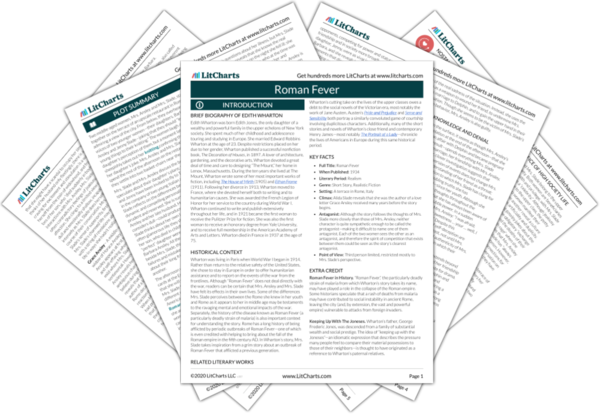Mrs. Ansley and Mrs. Slade belong to the upper echelons of society. Both women are beneficiaries of exceptional wealth and privilege, with Mrs. Slade even describing her husband as a “celebrity.” Although jealousy and betrayal are hardly exclusive to the upper class, the petty and indirect ways in which the two women manifest their barely-repressed resentment of one another reveal a culture that not only permits but encourages artificiality and duplicity. Mrs. Slade, for instance, recalls making gossipy jokes about the police raiding the Ansleys’ home, and the obligatory “exchange of wreaths and condolences” that followed the deaths of their husbands. She also recalls being “blind with rage” when she forged the letter from Delphin, and concedes that Mrs. Ansley may be right when she points out that Mrs. Slade has “always gone on hating [her]” since they were young women. However, the two women have maintained polite social connections for decades despite these roiling tensions; their conversation on the roof seems to be the only direct confrontation they have ever had.
Mrs. Slade and Mrs. Ansley pass the afternoon on the terrace of an upscale restaurant, where Mrs. Ansley’s knitting offers her a veneer of civility and innocence as Mrs. Slade repeatedly makes thinly-veiled attacks. The beautiful sights that surround them mirror the careful facades of respectability that these two members of the upper class must maintain in their dealings with one another. As the afternoon fades into evening, a team of waiters begins preparing the tables for dinner: exchanging faded flowers for fresh ones, straightening chairs, and rushing to deal with a disheveled tourist who becomes a momentary blight on the elegant scene when she arrives in search of a lost elastic band. The scene on the terrace becomes a figure for the lives of upper-class people more generally, who strain tremendously to avoid conflict and maintain an appearance of easy elegance. As Wharton illustrates, this system is both toxic and unsustainable. As the two women reveal the dark truths that they have hidden and repressed throughout their relationship—about Mrs. Ansley’s affair, Mrs. Slade’s deceit, and also the jealousy, pity, and hatred they feel for each other—it becomes clear that their lives are built on unstable foundations. Lies are the heart of their most essential, identity-forming relationships—with their children, spouses, and friends. When Mrs. Slade allows a small amount of honesty into the relationship, she unwittingly forces all of the other painful truths to the surface, and in doing so undermines her entire sense of herself and her life.
The Artifice of High Society Life ThemeTracker

The Artifice of High Society Life Quotes in Roman Fever
“Moonlight—moonlight! What a part it still plays. Do you suppose they’re as sentimental as we were?”
“I’ve come to the conclusion that I don’t in the least know what they are,” said Mrs. Ansley. “And perhaps we didn’t know much more about each other.”
Mrs. Ansley had resumed her knitting. One might almost have imagined (if one had known her less well, Mrs. Slade reflected) that, for her also, too many memories rose from the lengthening shadows of those august ruins. But no; she was simply absorbed in her work.
“I don’t know why you should be sorry for me … After all, I had everything; I had him for twenty-five years. And you had nothing but that one letter that he didn’t write.”
Mrs. Ansley was again silent. At length she turned toward the door of the terrace. She took a step, and turned back, facing her companion.
“I had Barbara,” she said, and began to move ahead of Mrs. Slade toward the stairway.











